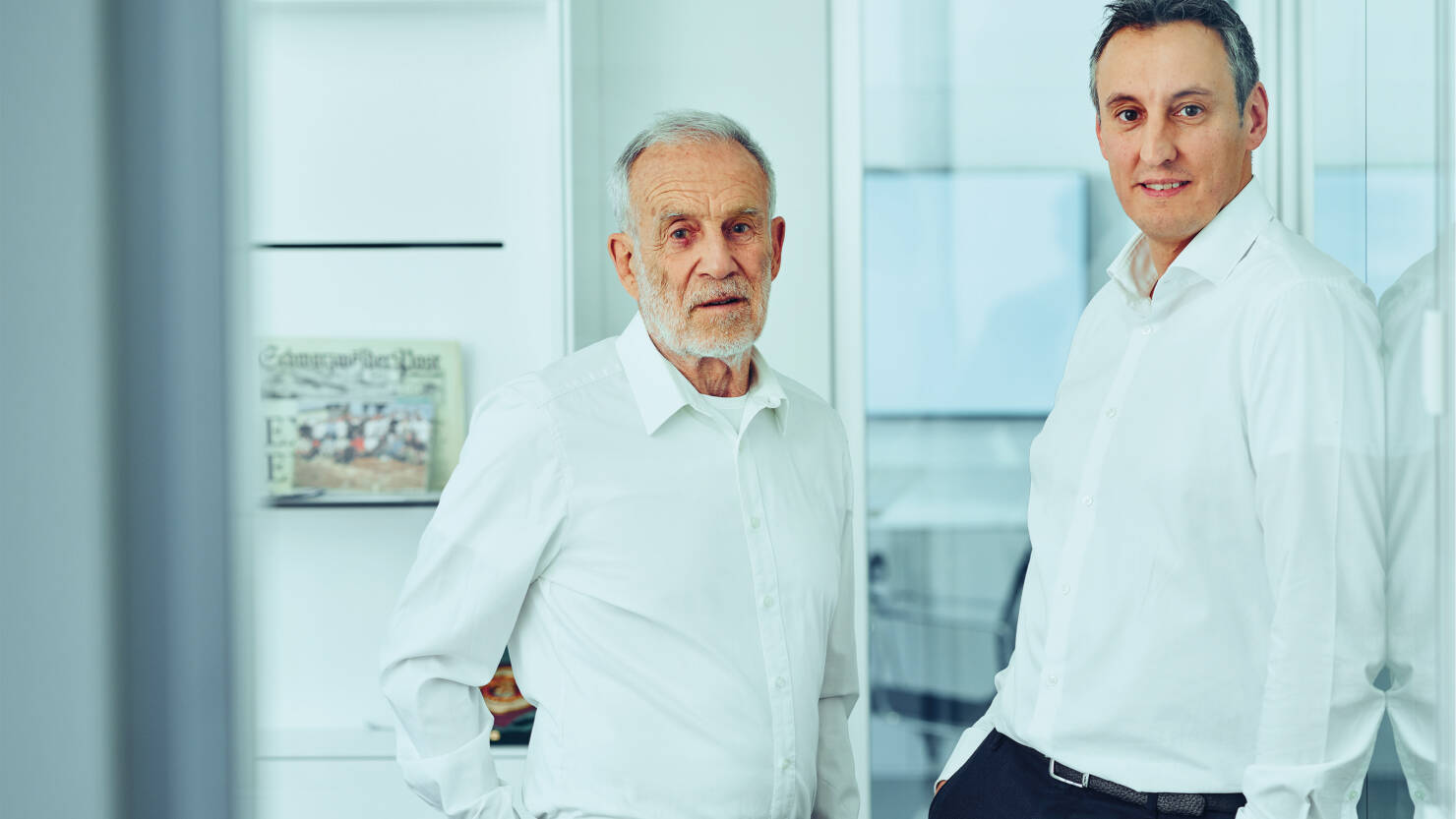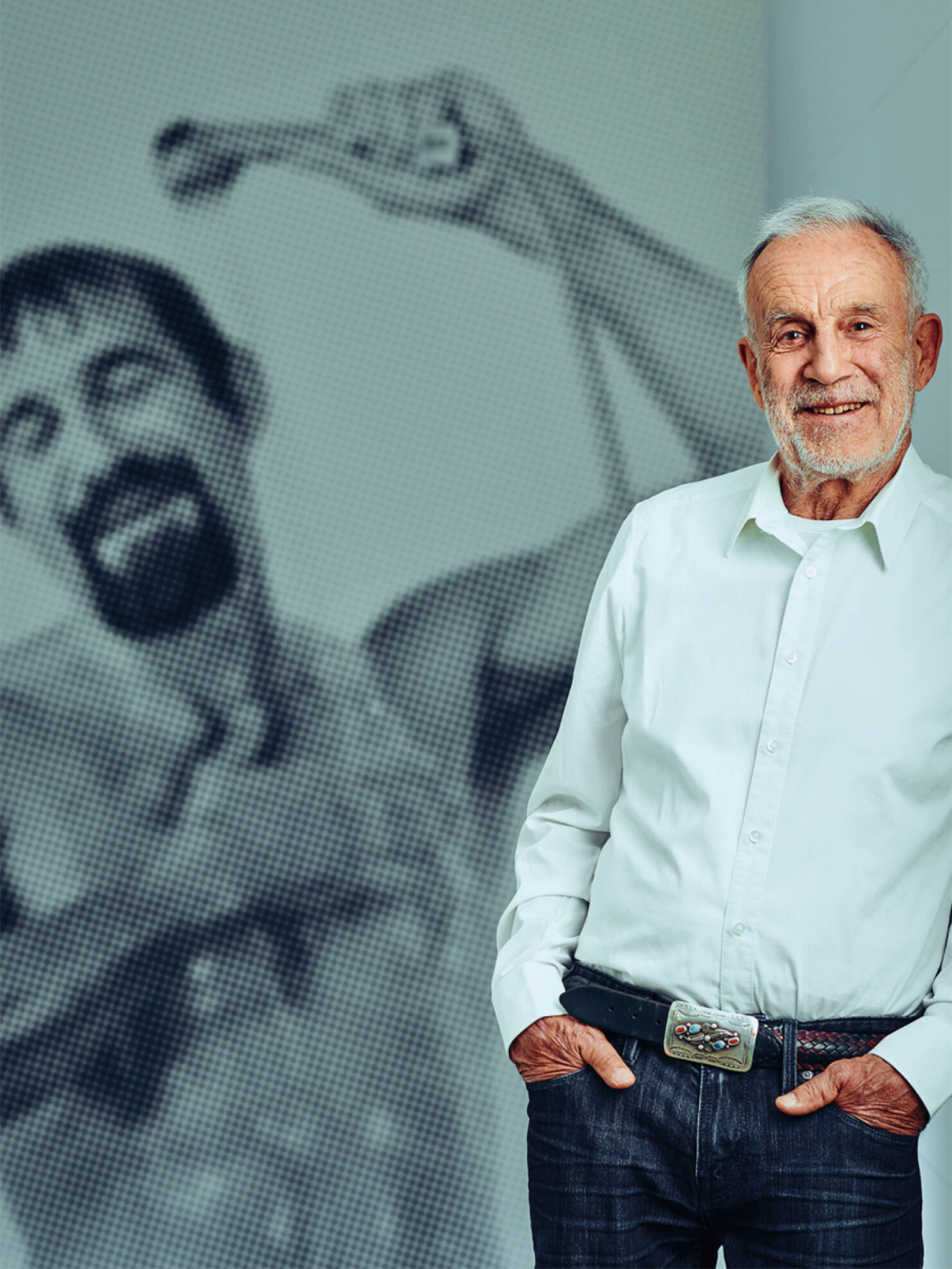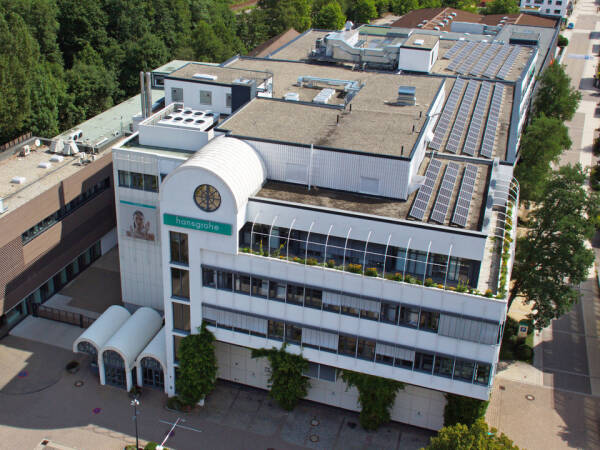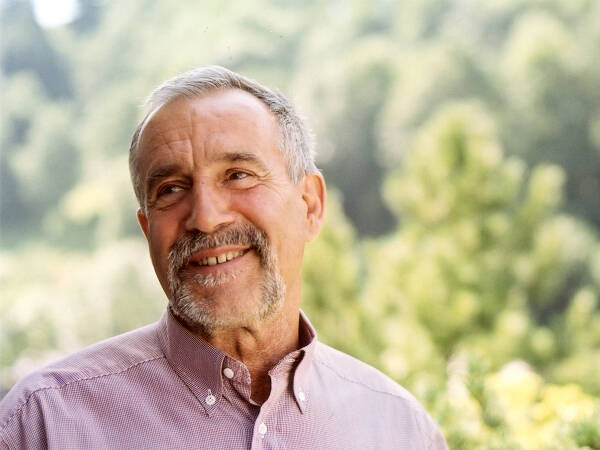Klaus Grohe, the third son of company founder Hans Grohe, joined the company in 1968. He was Chairman of the Executive Board until 2008 and Chairman of the Supervisory Board until 2015. Now he’s the Honorary Chairman of the latter.
In 1992 he commissioned what at that time was Europe’s largest rooftop solar power plant on the roof of the new factory building in Offenburg. In 1995 the Baden-Württemberg Minister of the Environment presented the company with the state’s special achievement award for environmental protection.
Interview with Klaus Grohe and Hans Jürgen Kalmbach
Responsibility Grows with the Company
Hansgrohe has a strong connection to sustainability, alone due to the location of its headquarters in Schiltach, framed by mountains, forests, and two rivers. An inner attitude has developed there over the years and is still embraced to this day, passed on from one generation to the next. Klaus Grohe and Hans Jürgen Kalmbach explain how this sense of responsibility came about and what sort of an impact it has on the company today.

Clean water is and will always be a key element for Hansgrohe
How did the sense of responsibility come about? What sort of an impact does it have on Hansgrohe today? These and other questions motivate Klaus Grohe, son of the founder of the company, and Hans Jürgen Kalmbach, Chief Executive Officer of the Hansgrohe SE, whose answers reveal interesting parallels. Many of Klaus Grohe’s ideas and initiatives have become blueprints for how to deal with the economic, environmental, and social challenges of today and the future.How did the two of you learn about responsibility?
Klaus Grohe (K.G.): Through imitation. My sense of responsibility has developed naturally over time. Our house was built right next to the company. I only had to open the door and was standing in the middle of the company stairwell. I learned a lot by watching my father.
Hans Jürgen Kalmbach (H.K.): It was much the same for me. Mentors and role models are a great source of motivation. In my role today, I have to set an example and live up to the values, which is the only way to have any credibility and promote responsible behavior at the company. Responsibility needs to be sustainable across all levels.
K.G.: When my father was around, they didn’t call it sustainability, but they were basically talking about the same thing. It was about a respect for things, which had unfortunately gotten lost with the emergence of the global throwaway culture. But values like these are important again to the generations of today. I can share a short story with you: My father’s office was also his testing laboratory. For example, he attached electroplated parts to a wire, which he hung out the window, exposing the parts to the elements. This served as a form of quality control and allowed him to assess the durability of his products. I was fascinated by this idea as a child. You can satisfy customers with your own high standards. That’s something I internalized and eventually implemented in my own way.
What does responsibility look like today at Hansgrohe?
H.K.: Today it encompasses the entire company in a global context and even applies to economic targets. People require safe surroundings to reach their potential, but that shouldn’t come at the expense of the environment. It’s up to the Executive Board to responsibly balance the relationship between these elements and inform everyone involved accordingly. Hopefully everyone will then behave responsibly at all times in their daily work. An important topic for us is, of course, the use of water as a resource.
What does this resource mean for the company?
H.K.: Water is the elixir of life. Nothing’s possible without it. The social interest in clean water and its availability to everyone is thus also our own. We’re well aware of our responsibility in this arena.
K.G.: I’m in complete agreement. I grew up with nature. When I was a little boy, I used to catch trout in the clear water of the Kinzig river with my bare hands. I wanted to pass on my attitude toward water that I’d developed through situations like these. I think I’ve done a fairly good job of that. Clean water is and will always be a key element for Hansgrohe in the truest sense of the word.
H.K.: To reiterate, Klaus Grohe introduced products with reduced water flow in the 1980s. Ten years later he said, “Climate change is a reality.” He was ahead of his time and encouraged all of us here to be more environmentally conscious. We’ve embraced this attitude for decades and keep it alive with new solutions.
Does everyone feel that way?
H.K.: Definitely. Society is fundamentally changing the way it thinks, as sustainability is an economic success factor that needs to be taken seriously. Just think about carbon taxes, which affect all of us. In the future people will pay a lot more attention to product sustainability and follow their conscience. For example, many hotels only use environmentally responsible products. We need to consolidate our leading edge as a sustainability pioneer in the bathroom.
A question of culture: Open doors are an invitation for dialogue

On what basis is sustainability promoted at Hansgrohe?
H.K.: We’re guided by our own corporate philosophy, the “U'Phil ,” which Klaus Grohe also launched in the 80s. We recently updated it, reformulating it to be as succinct as possible. Employees need to be able to internalize the four primary messages – passion, appreciation, collaboration, and trust – directly and as quickly as possible. As a global company, we also want to be understood in other countries and cultures.
How did this corporate philosophy come about?
K.G.: We simply grew at a rapid pace and new employees didn’t always immediately grasp the Hansgrohe spirit. For example, there were a few employees who would come to work in the morning and wouldn’t greet their colleagues. But success is only possible together. So with a team of 13 people, we went to work creating a sort of manifesto and put together an entire value system. Later on, we often encountered misunderstanding in various departments and had to spend a great deal of time explaining the idea behind it. So we came up with a mascot for our U'Phil: “Meister Hans,” who sets an example by cordially greeting his colleagues with “Good morning!” That seemed to do the trick. The U'Phil is still practiced to this day, which makes me very happy.
H.K.: For me, corporate culture really begins with greeting your colleagues. That’s often how conversations get started. Talking to each other is now more important for us than ever before. At our company, an open environment also takes the form of open doors, which represents an invitation for dialogue.
There aren't any inhibitions?
H.K.: Everyone can and should overcome them. In the Executive Board we do the same thing and actively look for opinions. We call one of the measures “Executive Board on Tour.” We regularly visit the plants and listen carefully to what the employees have to say: What preoccupies the people in assembly? What’s the mood like? Where can we make things better? Listening demonstrates appreciation. We want to take part in water cooler chat. I’ve been working at Hansgrohe for 25 years and many still call me Hans Jürgen. So don’t be afraid of contact. And if at some point I don’t have time, everyone has my e-mail address. I’ve experienced it myself with Klaus Grohe. I’ve always appreciated his candor.
K.G.: Well, I’ve always been a very open person and have never had to adjust in that sense. That may have been unusual in the late 1960s, but you’ll find a certain amount of familiarity everywhere these days. And, still, you can be professional.
What's being done for employees in terms of sustainability?
H.K.: A lot. For example, many come to work in Schiltach and Offenburg from the surrounding areas. We support them with a pass for public transportation. Employees thus reduce their fuel consumption, help to protect the environment, and don’t require a parking space. Another project with benefits for the employees and the company is our Hansgrohe Campus. Anyone can attend and prepare for the future. There are six faculties: Strategy & Innovation, Employees & Management, Sales, Digital, Brand and Efficiency. Individuals can thus develop on a personal basis and improve their career prospects over the long term. The newly gained knowledge and employee networking are good for the company, too.
What's one of Hansgrohe's sustainable strenghts?
K.G.: I’d say it’s Schiltach as a location. I’m on a first-name basis with a lot of people here and I’ve always wanted to have this feeling at a company: familiar, considerate, and friendly. We’ve always assumed responsibility for the staff, which is something everyone can feel in the form of secure jobs and social services. And that comes back to us in the form of dedication and loyalty. Something like that is much easier here than in the anonymity of a big city.
H.K.: There’s something to that. As a global player, we enjoy a great deal of approval around the world, which is something we’d like to protect. Our sense of social responsibility is well reflected in our naturally growing spirit.
H.K.: We’re guided by our own corporate philosophy, the “U'Phil ,” which Klaus Grohe also launched in the 80s. We recently updated it, reformulating it to be as succinct as possible. Employees need to be able to internalize the four primary messages – passion, appreciation, collaboration, and trust – directly and as quickly as possible. As a global company, we also want to be understood in other countries and cultures.
How did this corporate philosophy come about?
K.G.: We simply grew at a rapid pace and new employees didn’t always immediately grasp the Hansgrohe spirit. For example, there were a few employees who would come to work in the morning and wouldn’t greet their colleagues. But success is only possible together. So with a team of 13 people, we went to work creating a sort of manifesto and put together an entire value system. Later on, we often encountered misunderstanding in various departments and had to spend a great deal of time explaining the idea behind it. So we came up with a mascot for our U'Phil: “Meister Hans,” who sets an example by cordially greeting his colleagues with “Good morning!” That seemed to do the trick. The U'Phil is still practiced to this day, which makes me very happy.
H.K.: For me, corporate culture really begins with greeting your colleagues. That’s often how conversations get started. Talking to each other is now more important for us than ever before. At our company, an open environment also takes the form of open doors, which represents an invitation for dialogue.
There aren't any inhibitions?
H.K.: Everyone can and should overcome them. In the Executive Board we do the same thing and actively look for opinions. We call one of the measures “Executive Board on Tour.” We regularly visit the plants and listen carefully to what the employees have to say: What preoccupies the people in assembly? What’s the mood like? Where can we make things better? Listening demonstrates appreciation. We want to take part in water cooler chat. I’ve been working at Hansgrohe for 25 years and many still call me Hans Jürgen. So don’t be afraid of contact. And if at some point I don’t have time, everyone has my e-mail address. I’ve experienced it myself with Klaus Grohe. I’ve always appreciated his candor.
K.G.: Well, I’ve always been a very open person and have never had to adjust in that sense. That may have been unusual in the late 1960s, but you’ll find a certain amount of familiarity everywhere these days. And, still, you can be professional.
What's being done for employees in terms of sustainability?
H.K.: A lot. For example, many come to work in Schiltach and Offenburg from the surrounding areas. We support them with a pass for public transportation. Employees thus reduce their fuel consumption, help to protect the environment, and don’t require a parking space. Another project with benefits for the employees and the company is our Hansgrohe Campus. Anyone can attend and prepare for the future. There are six faculties: Strategy & Innovation, Employees & Management, Sales, Digital, Brand and Efficiency. Individuals can thus develop on a personal basis and improve their career prospects over the long term. The newly gained knowledge and employee networking are good for the company, too.
What's one of Hansgrohe's sustainable strenghts?
K.G.: I’d say it’s Schiltach as a location. I’m on a first-name basis with a lot of people here and I’ve always wanted to have this feeling at a company: familiar, considerate, and friendly. We’ve always assumed responsibility for the staff, which is something everyone can feel in the form of secure jobs and social services. And that comes back to us in the form of dedication and loyalty. Something like that is much easier here than in the anonymity of a big city.
H.K.: There’s something to that. As a global player, we enjoy a great deal of approval around the world, which is something we’d like to protect. Our sense of social responsibility is well reflected in our naturally growing spirit.
“Familiar, considerate, and friendly. We’ve always assumed responsibility for the staff.”Klaus Grohe
The environmental perspective is part of the inspiration

How will customers experience sustainability in the future?
H.K.: Our motto will remain “Meet the beauty of water.” One of the ways we make this possible is with a better assessment of the entire life cycle of a product, which allows me as a customer to save water and energy costs. In other words, we offer a clear conscience in terms of the environment as standard. We reduce the flow of water per minute without compromising the experience. We carry out in-depth research to identify more effective spray modes. Shower water can be recycled. Defective faucets can be repaired or recycled and don’t have to be thrown away. We also want to use materials more economically and conserve resources. A lot of things are made from metal at present, though this might change. There are now biological base materials produced using 3D printers. All of that needs to be economically feasible. But the environmental perspective is part of the inspiration. You can achieve great things with many small steps. And that’s what we’ll continue to do.
K.G.: I agree with Mr. Kalmbach. It’s about never losing your curiosity. You need to question the status quo. Is there a better way? Can you make it more sustainable? Does that fit in with our values? Then you do some experimenting and eventually something good comes of it.
So will there soon be organic showers?
H.K.: By that time, a lot of water will have flown down the Schiltach. But we’re considering everything. New ideas turn into new successes. We already have faucets made of glass, which no one had ever imagined before.
K.G.: That reminds me. My father used to always think about progress. Just imagine it from today’s perspective. Water is finally available in the home and comes out of the wall, making people’s everyday lives much more convenient. No one has to carry the heavy bucket of water from the well to the house through wind and rain anymore. All of a sudden, hygiene is effortless and a simple faucet has social significance. We face a similar opportunity today. So we need to do the right thing now and do our part to create a world worth living in. We have everything we need – great people with experience and a whole lot of ideas. We’ve already recognized the signs of the time. I’m confident that we can do it.
H.K.: Our motto will remain “Meet the beauty of water.” One of the ways we make this possible is with a better assessment of the entire life cycle of a product, which allows me as a customer to save water and energy costs. In other words, we offer a clear conscience in terms of the environment as standard. We reduce the flow of water per minute without compromising the experience. We carry out in-depth research to identify more effective spray modes. Shower water can be recycled. Defective faucets can be repaired or recycled and don’t have to be thrown away. We also want to use materials more economically and conserve resources. A lot of things are made from metal at present, though this might change. There are now biological base materials produced using 3D printers. All of that needs to be economically feasible. But the environmental perspective is part of the inspiration. You can achieve great things with many small steps. And that’s what we’ll continue to do.
K.G.: I agree with Mr. Kalmbach. It’s about never losing your curiosity. You need to question the status quo. Is there a better way? Can you make it more sustainable? Does that fit in with our values? Then you do some experimenting and eventually something good comes of it.
So will there soon be organic showers?
H.K.: By that time, a lot of water will have flown down the Schiltach. But we’re considering everything. New ideas turn into new successes. We already have faucets made of glass, which no one had ever imagined before.
K.G.: That reminds me. My father used to always think about progress. Just imagine it from today’s perspective. Water is finally available in the home and comes out of the wall, making people’s everyday lives much more convenient. No one has to carry the heavy bucket of water from the well to the house through wind and rain anymore. All of a sudden, hygiene is effortless and a simple faucet has social significance. We face a similar opportunity today. So we need to do the right thing now and do our part to create a world worth living in. We have everything we need – great people with experience and a whole lot of ideas. We’ve already recognized the signs of the time. I’m confident that we can do it.





